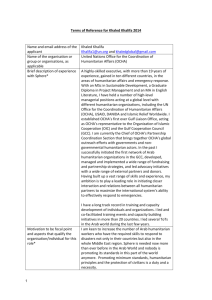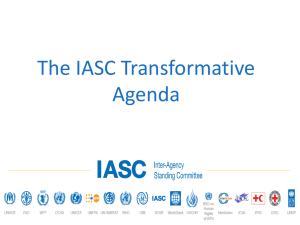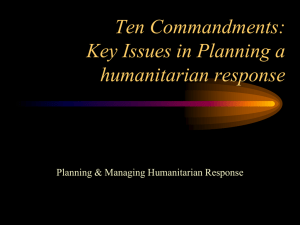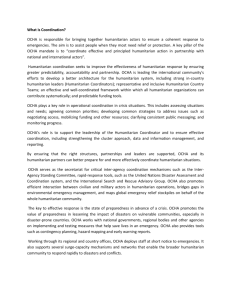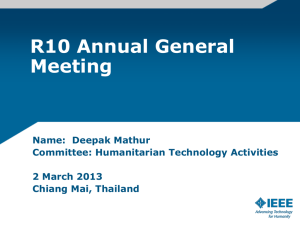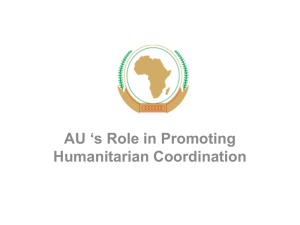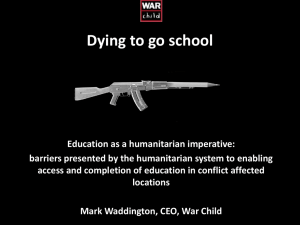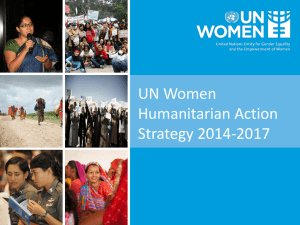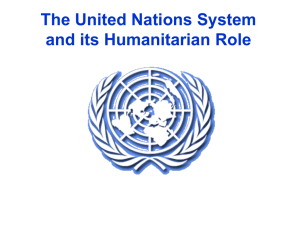Implementation of Humanitarian Strategy
advertisement
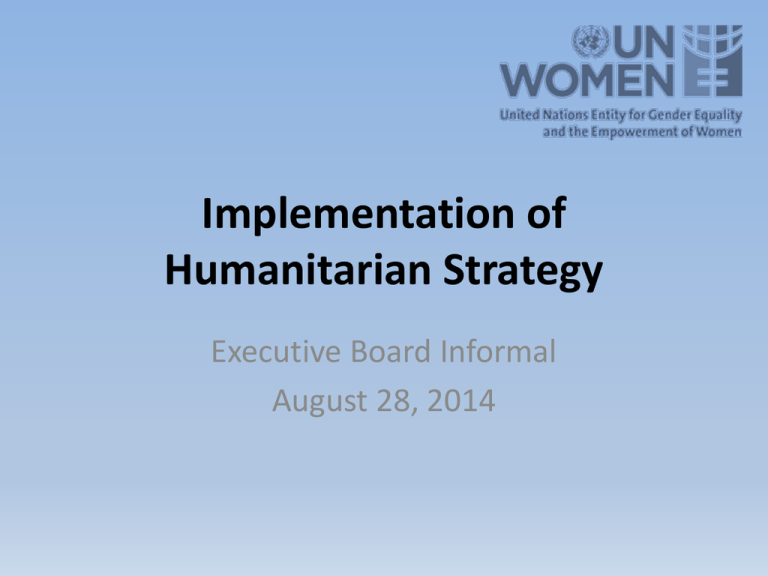
Implementation of Humanitarian Strategy Executive Board Informal August 28, 2014 Implementation of Humanitarian Strategy • UN Women’s Humanitarian Strategy, prepared in consultation with EB members and other stakeholders, defines its coordination and leadership role in promoting gender equality and women’s empowerment in humanitarian action. • The strategy contributes to achieving UN Women’s Strategic Plan (2014-2017) Impact 4 - Peace and security and humanitarian action are shaped by women and men’s equal leadership and participation. UN Women’s Work at the Global Level (1/2) Normative • SG’s 2014 Report on CSW Resolution 56/2 Gender Equality and Women’s Empowerment in Natural Disasters; • “Impact of Gender Equality Programming on Humanitarian Outcomes” study completed and presented to ECOSOC Humanitarian Affairs Segment. • Co-Chair of IASC Gender Reference Group and Secretariat support. • Preparation for the 2016 World Conference on Disaster Risk Reduction Inter-agency Support • Active member of GenCap Steering Committee; • Active participant in Preparedness and Resilience Task Team; • Support to the Gender Marker review process; • Development of PDNA Gender Chapter and regional training roll out. UN Women’s Work at the Global Level (2/2) Technical Support • Field support missions to South Sudan, Kenya, Jordan. • Technical support to programmes in DRC, Colombia, Uganda and Cameroon • Technical support to UN Women’s humanitarian response in Iraq, Tajikistan and the Ebola outbreak; • Deployment to the PDNAs in the Balkan – BiH and Serbia; • UN Women’s internal surge capacity mechanism, including SOPs initiated. UN Women’s Work in the Field • South Sudan: Comprehensive gender analysis to inform Humanitarian Strategic Response Planning. • occupied Palestinian territories: Capacity building of women’s organisations for inclusion in humanitarian coordination. • Iraq: Psycho-social services that addresses the ongoing violence and specific needs of women. • Jordan: Women friendly spaces "Oasis" for Syrian women refugees. • DRC: Assisting women and girls displaced by conflict through GBV survivor services, community mobilization and livelihood support. • Cameroon: Providing assistance to survivors of SGBV in three refugee camps in the Eastern Central African Republic. • Uganda: Conducting gender analysis to better integrate gender equality in humanitarian programming for South Sudanese refugees. UN Women – OCHA Partnership (1/2) Goal: To advance gender equality programming in humanitarian action through: • Strengthened gender responsive and informed humanitarian action that meets the needs and concerns of women and men of different ages; • Joint HCT strategies promoting collective action for inclusive and active participation of women, men, boys and girls; • Enhanced capacities and skills of humanitarian actors that promote and utilize evidence based programming. UN Women – OCHA Partnership (2/2) • Six countries identified: Pakistan, oPt, Central African Republic, South Sudan, Colombia. • UN Women deployed national gender and humanitarian specialists (NoC): DRC, South Sudan, Pakistan, Colombia. • Gender Advisors in Palestine, South Sudan, Syria, Iraq and potentially CAR • NorCap partnership: support in Jordan, Gaza and South Sudan and potentially Cameroon. • UN Women - OCHA MoU in Pakistan being implemented • UN Women deploying Gender Expert to the World Humanitarian Summit Secretariat effective October 2014. • UN Women – OCHA regional training beginning in Asia and Pacific. Next Steps • UN Women has requested “standing invitee” membership to the IASC. • Roll out of the UN Women and OCHA partnership initiative. • Mobilize resources and partners to implement the humanitarian strategy. • Continue to work within humanitarian system to ensure accountability to policy and operational commitments made to gender equality and women’s empowerment. • Sustain country efforts through continuous support to civil society organizations, women’s groups and women’s machinery.

